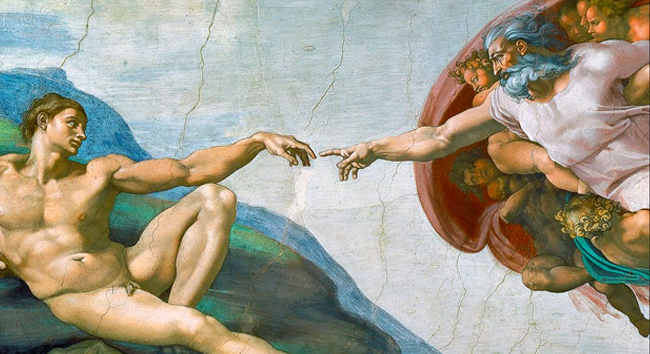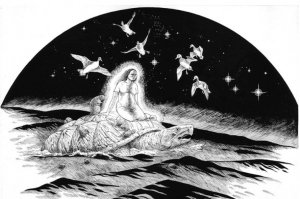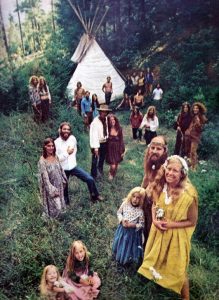Reading Prompt: Each student should select a section of Green Grass Running Water approximately 10 pages. The task at hand is to first discover as many allusions as you can to historical references (people and events), literary references (characters and authors), mythical references (symbols and metaphors). While I am suggesting a method to help organize your task — you should quickly discover that there is no method for making neat categories out of King’s numerous (and humorous) allusions and references. Instead of categories, what you will discover are connections, and inter-connections and cycles.

(Photo taken from Reasonable Faith. “The Historical Adam and Eve”. February 2015.)
For my blog post, I chose to look at a passage in Part 1 of Thomas King’s Green Grass, Running Water (GGRW). Unfortunately, since I read this book in the Kindle Edition on my laptop, it gives me a ‘location’ rather than a page number, and these locations increase by around 10 every time I click for the next page. Therefore, for my close reading, I chose to look at location 361 to 418. This is in Part 1 of the text, and is around 8% into the novel. I chose to focus mainly on the numerous biblical illusions found in this passage, particularly in relation to the Genesis story.
GOD/dog
The first allusion that I wished to look at is the dog, who insists on being called GOD. GOD is depicted as similar to the “loud-voiced God of the Old Testament” (Flick, 143), with numerous references to the Biblical God, particularly to the Genesis story. The insistence on capitalizing all the letters of GOD made me think of two things. Firstly, in the Bible, the title LORD is often shown completely capitalized (such as in Exodus 15:11). As well, in the bible the word God always has a capital ‘G’ in reference to the Christian God, whereas god’s (other ‘idols’ worshiped by humans) is always lowercase (for example, Exodus 23:13; Deuteronomy 32:39; Isaiah 43:10). Secondly, when words are completely capitalized, it often signifies yelling. GOD seems like an obnoxious, loud character, who Coyote has to ask to quiet down. The capitalization of his name contributes to his depiction as a slightly whiny, immature and loud character.
We see references to the Genesis story when GOD asks “What happened to my void?”, and “Where’s my darkness?”, referencing how the Genesis story begins, with God surrounded by a dark void. King also references the story when he writes, “And everything is perfect. And everything is beautiful”, a reference to the repetitive statement in Genesis, when God looks at each creation after making it and states that he is pleased. In King’s novel, GOD’s self-centered demands continue humorously throughout the entire passage that I selected. He whines “that’s my garden. That’s my stuff”, and then says, “They can’t eat my stuff”, before jumping into the garden. King depicts the GOD as intolerant and childish in the way he attempts to command the story, and control what is ‘his’ role.
First Woman
The First Woman is a reference to the native creation story, which King tells in more detail here. While parts of that native story are told in GGRW, such as the Woman’s fall, the turtle and the making of the land, this story of the First Woman also contains elements of the Bible’s Eve. Choosing to refer to her as the ‘First Woman’ is itself a subtle reference, as Adam and Eve are most commonly referred to as the ‘First man’ and ‘First woman’. The name Eve literally means “the mother of all human beings”. As well, in GGRW the First Woman lives in the garden with Ahdamn, a reference to the Garden of Eden where Adam and Eve live in Genesis. As well, the First Woman walks around “with her head in the clouds”, which I think is probably a reference to Eve’s clued-out naivety in the Genesis story, where she is depicted as curious and slightly unintelligent, eating a fruit which God told her not to because a serpent tells her it will give her knowledge. Finally, the tree that First Woman bumps into, and the food she takes from it, is a reference to the Tree of the Knowledge of Good and Evil in the Bible. There is a common assumption that the fruit in the Adam and Eve story was an apple, which is the first food item King lists as falling out of the tree. However, he then gives a list of increasingly yummier and more processed/unhealthy foods – Melons, Bananas, Hot dogs, Fry bread, corn, potatoes, Pizza, and fried chicken (Location 399). King mocks the Genesis story, suggesting that if a food item is able to cause the downfall of mankind, it must be something yummier than an apple – surely, Pizza is a more likely alternative. As well, the passage I chose concludes with First Woman bringing the food to Ahdamn, and putting it all in front of them. Neither has yet eaten the food, and already GOD jumps into the garden to claim his stuff, leaving the outcome inconclusive, while still a clear play on the Genesis story.
Ahdamn
Ahdamn is a rather obvious reference to the biblical Adam, who lives in the Garden with Eve during the Genesis story. Differing from the Adam in the bible, Ahdamn does not come first – rather, it is First Woman’s garden, and Ahdamn simply lives there with her. The narrator states that he does not know where Ahdamn came from (location 399). King plays with the word Adam, inserting ‘damn’ into his name. This is likely alluding to Adam and Eve’s mistake, in eating the forbidden fruit and getting kicked out of the garden, and therefore “damning” humankind. What is interesting is the blame that is put on Adam in this mistake. Often, Eve is seen as the one deserving more of the blame, since she ate the fruit first, and then offered it to Adam. However, King plays with a role reversal of sorts – having the woman appear first in the Garden, and as a ‘God-like figure’, emphasizing Adam’s role in the damning of mankind, as well as portraying Ahdamn as a rather unintelligent character. King references the task that God gave Adam and Eve in the Genesis story of naming all the animals. However, Ahdamn’s unintelligence is shown in his comical inability to correctly name all of the animals. In the bible, Adam is given a certain level of respect, as the first man and the person appointed as ruler over the earth and the animals on it. King manipulates this story, to depict an incapable ‘man-in-charge’.
Works Cited
Biblegateway. Holy Bible, Good News Translation (GNT). Retrieved from biblegateway.com
Biblegateway. Holy Bible, New International Version (NIV). Retrieved from biblegateway.com
Flick, Jane. “Reading Note’s For Thomas King’s Green Grass, Running Water”. Canadian Literature, 1994, pp. 140-172.
King, Thomas. Green Grass, Running Water. Harper Perennial. Kindle Edition.
King, Thomas. “The Truth about Stories – Part 1”. The 2003 CBC Massey Lectures. Nov 2003.
Michelangelo. The Creation of Adam. 1508-1512. Vatican, Rome. “The Historical Adam and Eve”. Reasonable Faith. February 2015.




